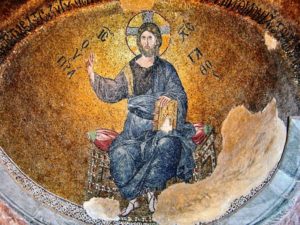Orthodox Spirituality
19 August 2022Orthodox spirituality is the life of the christian which is inclined to become spiritual in the Holy Spirit. In other words, christian spirituality, as in a life of freedom in Christ, Godlike and Christlike. Orthodoxy, that is orthodox spirituality, expresses the spiritual tradition with its dogmatic principles and psychosomatic labour. In this instance, the faithful experience the historical and eschatological union in the life of the Holy Spirit, in the theanthropic body of Christ, namely the Church.
Orthodox spirituality is the Theanthropic Christ and His Church, which is the Theanthropic “workshop”, as Saint Justin (Popovich) so characteristically points out. “The Church is the Theanthropic workshop in which we, through the divine sacraments and virtues, become Godmen, Godlike, Christlike, and are transformed into Godmen and gods by the grace of God. Everything, in this case, exists through God, in God, according to God. Everything falls under the category of the God-man and God-eternal. [Saint Justin (Popovich) Dogmatic, Holy Monastery of Batopedi, Holy Mountain 2019, pg.39].
The faithful, who tread the path of authentic creativity, incessant transformation and renewal, strive to become one with God. While on this path, human existence is recognized. This struggle is never-ending, multimodal with an eschatological dimension and orientation. Man experiences orthodox piety when he communes in the holy ceremonies, thus cultivating an honest and genuine love for the Holy Mother of God, the Saints, the Holy relics and sacred temples, while at the same time partaking in the divine and unspeakable mysteries of the Church. With our participance in the Eucharistic gathering, God is revealed. Man participates with all his heart and all his being to encounter the resurrected Christ, both in theory and practice: ”Who will give me wings like a dove? And I will fly by activity, and be at rest by contemplation and humility.” (St John Climacus, The Ladder of Divine Ascent, «Αστήρ» publications, Step 4). This is evident in the spiritual experiences of the Saints and Fathers of the Church who incarnate the evangelic word of Christ and whose lives are biblical and Christ-centered.
Besides all others, through the mystery of repentance and strenuous, toilsome labour, the path of the faithful in orthodox spirituality has a mystical character. It is a path of purification from the passions, enlightenment and perfection. A path of struggle to return to the state before the fall so the uniqueness of the person can be emphasized. “Great is the dignity of man. See how mighty are the heaven and the earth, the sun and the moon; but the Lord was not pleased to rest in them, but in man only. Man, therefore, is of more value than all created things”. (Macarius the Egyptian, PG 34, 589). There is no meaning and beauty in the world without the human presence. Man is the minister, the prophet and king, and through these offices, meaning is given to his mission.
In orthodox spirituality, the faithful fight to detach themselves from the old man and be clothed in the “new” man, the new Adam, Christ: “You have put away the old man with all his doings, and have put on the new man, which has become new in knowledge after the image of his maker” (Col. 3, 9-10). It is a struggle of “crucifying” the inferior, inward person “those who are Christ’s have put to death on the cross the flesh with its passions and its evil desires” (Gal. 5, 24). This spirituality is not a moralistic and moralizing perception, a conventional and external compliancy, but a true change and “good alteration”, with an eschatological character, thus making it ontological. “This was the very purpose of the coming of our Lord Jesus Christ, to change and alter and renew nature, and to create afresh this soul that was overturned by passions through the transgression, mingling it with His own Spirit, the Spirit of Godhead. New mind, and new soul, and new eyes, new ears, a new spiritual tongue, and in short new men altogether- this was what He came to make of those who believe Him”. (Macarius the Egyptian, PG 34,780).
Church is the place of true spirituality, where the divine presence exists. With its educational power, the faithful are given the opportunity to taste the luscious fruit granted by the Holy Spirit, the succulent fruit of spiritual salvation, thus gaining entrance to the Kingdom of God: “But the fruit of the Spirit is love, joy, peace, a quiet mind, kind acts, well-doing, faith, gentle behaviour, control over desires: against such there is no law” (Gal. 5, 22-23). This is exactly what our Saints accomplished, they reached theosis by the Grace of God, through labour and abidance of His law. They are “the men of God who are complete” (2 Tim. 3, 17). The following church hymn summarizes orthodox spirituality in its entirety : “Yesterday, O Christ, I was buried with Thee, and today I arise with thy arising. Yesterday I was crucified with Thee. Glorify me, O Savior, with Thee in Thy Kingdom”.(Paschal Canon, troparion of the 3rd ode).







